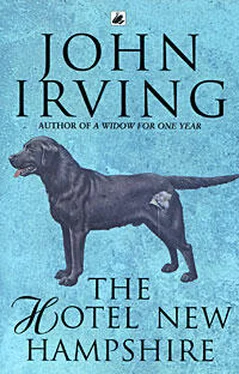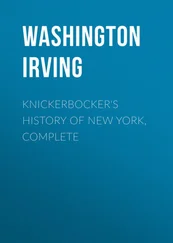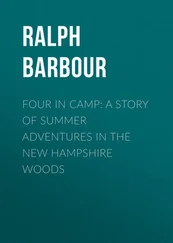“ Auf Wiedersehen , Frank,” Lilly said, when her little song was over.
Frank didn’t answer her. He ran down to Columbus Circle and caught an uptown cab. And even though Frank was no runner, I’m sure he made good time; I couldn’t have done any better. Even if he’d been home when Lilly called, I always told him that it would take anyone longer to cover twenty blocks and a zoo than it takes to fall fourteen stories—the distance from the window of the corner suite on the Stanhope’s fourteenth floor to the pavement at Eighty-first and Fifth Avenue. Lilly had a shorter trip to take than Frank’s, and she would have beaten him to her destination—regardless; there was nothing he could have done. Even so, Frank said, he didn’t say (or even think to himself), “ Auf Wiedersehen , Lilly,” until after they’d shown him her little body.
She left a better note than Fehlgeburt had left. Lilly was not crazy. She left a serious suicide note.
Sorry,
said the note.
Just not big enough.
I best remember her little hands: how they leaped about in her lap, whenever she said anything thoughtful—and Lilly was always thoughtful. “Not enough laughter in her, man,” as Junior Jones would say. Lilly’s hands could not contain themselves; they danced to whatever she thought she heard—maybe it was the same music Freud tapped his baseball bat to, the same song Father is hearing now, the bat stirring gracefully at his tired feet. My father, the blind walker: he walks everywhere, he covers the grounds of the Hotel New Hampshire for hours every day, summer and winter. First Sacher led him, then Schlagobers, then Fred; when Fred developed his habit of killing skunks, we had to get rid of him. “I like Fred,” Father said, “but between the farting and the skunks, he’ll drive the guests away.”
“Well, the guests aren’t complaining,” I told Father.
“Well, they’re just being polite,” Father said. “They’re showing their class, but it’s loathsome, it’s truly an imposition, and if Fred ever attacks a skunk when I’m with him … well, for Christ’s sake, I’ll kill him; it’s the baseball bat for him, then.”
So we found a nice family who wanted a watchdog; they weren’t blind, but they didn’t care if Fred farted and smelled like a skunk.
And now Father walks with Seeing Eye Dog Number Four. We got tired of naming them, and when Lilly died, Father lost a little more of his playfulness. “I just am not up to naming another dog,” he said. “Want to do this one?” But I wasn’t up to a dog-naming either. Franny was shooting a film in France, and Frank—who was the hardest hit by Lilly’s leaving us—was irritated at the whole idea of dogs. Frank had too much sorrow on his mind; he wasn’t in a mood for naming dogs at all.
“Jesus God,” Frank said. “Call it Number Four.”
My father shrugged and settled for just plain old “Four.” So that now, in the twilight, when Father is searching for his walking companion, I hear him screaming the number four. “Four!” he bellows. “Goddamn it, Four!” And old Fred, the handyman, still cries out, “What?” And Father goes on with his “Four! Four! Four!” Like someone remembering a childhood game: that one where you throw up the ball and yell someone’s number, and the one called has to try to catch the ball before the ball hits the ground. “Four!” I hear Father calling, and I imagine some child running, arms held out for the ball.
Sometimes the child is Lilly, sometimes it’s Egg.
And when Father has finally found Four, I watch out the window as Four leads my father carefully down to the docks; in the failing light, it’s possible to mistake my father and his Seeing Eye dog for a much younger man on the dock—with a bear, perhaps; possibly they’re fishing for pollack. “It’s no fun fishing when you can’t see the fish come out of the water,” Father has told me. And so, with Four, Father just sits on the dock, welcoming the evening, until the fierce Maine mosquitoes drive him back to the Hotel New Hampshire.
There is even a sign: HOTEL NEW HAMPSHIRE. Father insisted on it, and although he can’t see it—and wouldn’t miss it, if I only pretended there was a sign—it is a concession I gladly make for him, although it is a nuisance, at times. Occasionally tourists get lost and find us; they see the sign and think we are a hotel. I have explained to Father a very complicated system that our “success” in this hotel business has afforded us. When the lost tourists find us and ask for rooms, we ask them if they have reservations.
They say no, of course, but invariably—looking around themselves, at the silence, at the abandoned quality of peace we have achieved at the third Hotel New Hampshire—they ask, “But surely you have vacancies?”
“No vacancies,” we always say. “No reservations, no vacancies.”
Sometimes Father argues with me about this. “But surely we have room for them,” he hisses. “They seem very nice. There’s a child or two, I can hear them quarreling, and the mother sounds tired—they’ve probably been doing too much driving.”
“Standards are standards, Pop,” I say. “Really, what would our other guests think if we got too loose about this?”
“It’s just so elitist,” he whispers, wonderingly. “I mean, I always knew this was a special place, but, somehow, I never dreamed it would actually …”And he usually breaks off his sentence right there, smiling. And then he adds, “Well, wouldn’t your mother have loved all this !” The baseball bat waves, showing it all to Mother.
And I say, without the slightest tone of qualification in my voice, “She sure would have, Pop.”
“If not every minute,” my father adds, thoughtfully, “at least this part. At least the end.”
Lilly’s end, considering her cult following, was as quiet as we could have it. I wish I’d had the courage to ask Donald Justice for an elegy but it was—as much as possible—a family funeral. Junior Jones was there; he sat with Franny, and I couldn’t help but notice how perfectly they held each other’s hands. It often takes a funeral to make you realize who has grown older. I noticed Junior had added a few gentle lines around his eyes; he was a very hardworking lawyer, now—we’d hardly heard from him when he was in law school; he disappeared almost as completely into law school as he had once disappeared into the bottom of a pile of Cleveland Browns. I guess law school and football are similarly myopic experiences. Playing in the line, Junior always said, had prepared him for law school. Hard work, but boring, boring, boring.
Now Junior ran the Black Arm of the Law, and I knew that when Franny was in New York, she stayed with him.
They were both stars, and maybe they were finally at ease with each other, I thought. But at Lilly’s funeral, all I could think was how Lilly would have loved seeing them together.
Father, next to Susie the bear, kept the heavy end of his baseball bat on the floor between his knees—just swaying slightly. And when he walked—on Susie’s arm, on the arm of Freud’s former Seeing Eye bear—he carried the Louisville Slugger with great dignity, as if it were simply a stout sort of cane.
Susie was a wreck, but she held herself together at the funeral—for Father’s sake, I think. She had worshiped my father ever since his miracle swing of the bat—the fabulous, instinctual swing that had batted Ernst the pornographer away. By the time of Lilly’s suicide, Susie the bear had been around. She’d left the East Coast for the West, and then had come back East again. She ran a commune in Vermont for a while. “I ran that fucker right into the ground,” she would tell us, laughing. She started a family counseling service in Boston, which blossomed into a day care center (because there was a greater need for one of those), which blossomed into a rape crisis center (as soon as day care centers were everywhere). The rape crisis center was not welcome in Boston, and Susie admits that not all the hostility was external. There were rape lovers and women haters everywhere, of course, and a variety of stupid people who were willing to assume that women who worked in a rape crisis center had to be what Susie called “hardcore dykes and feminist troublemakers.” The Bostonians gave Susie and her first rape crisis center a rather hard time. Apparently, as a way of making their point, they even raped one of the rape crisis center employees. But, even Susie admits, some of the rape crisis women in those early days were “hardcore dykes and feminist troublemakers,” they really were just man haters, and so some of the trouble at the rape crisis center was internal. Some of those women were simply anti-system philosophers without Frank’s sense of humor, and if the law-enforcement personnel were antagonistic to women wanting to see a little rape justice—for a change—so were the women antagonistic to the law, in general, and nobody really did the victim much good.
Читать дальше












